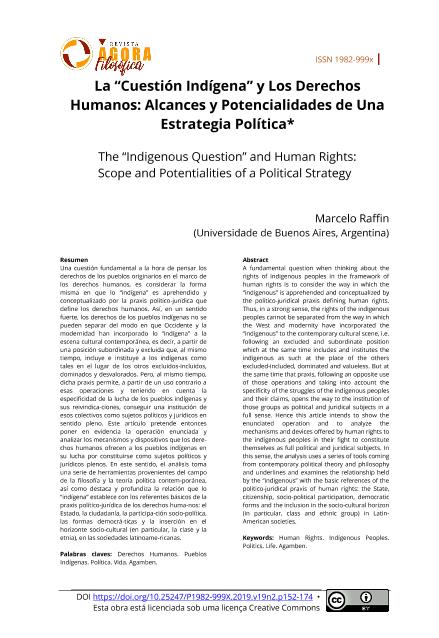Mostrar el registro sencillo del ítem
dc.contributor.author
Raffin, Marcelo

dc.date.available
2022-04-19T19:28:21Z
dc.date.issued
2019-09
dc.identifier.citation
Raffin, Marcelo; La "Cuestión Indígena" y Los Derechos Humanos: Alcances y Potencialidades de Una Estrategia Política; Universidad Católica de Pernambuco; Ágora Filosófica; 19; 2; 9-2019; 152-174
dc.identifier.issn
1982-999x
dc.identifier.uri
http://hdl.handle.net/11336/155316
dc.description.abstract
Una cuestión fundamental a la hora de pensar los derechos de los pueblos originarios en el marco de los derechos humanos, es considerar la forma misma en que lo “indígena” es aprehendido y conceptualizado por la praxis político-jurídica que define los derechos humanos. Así, en un sentido fuerte, los derechos de los pueblos indígenas no se pueden separar del modo en que Occidente y la modernidad han incorporado lo “indígena” a la escena cultural contemporánea, es decir, a partir de una posición subordinada y excluida que, al mismo tiempo, incluye e instituye a los indígenas como tales en el lugar de los otros excluidos-incluidos, dominados y desvalorados. Pero, al mismo tiempo, dicha praxis permite, a partir de un uso contrario a esas operaciones y teniendo en cuenta la especificidad de la lucha de los pueblos indígenas y sus reivindica-ciones, conseguir una institución de esos colectivos como sujetos políticos y jurídicos en sentido pleno. Este artículo pretende entonces poner en evidencia la operación enunciada y analizar los mecanismos y dispositivos que los derechos humanos ofrecen a los pueblos indígenas en su lucha por constituirse como sujetos políticos y jurídicos plenos. En este sentido, el análisis toma una serie de herramientas provenientes del campo de la filosofía y la teoría política contem-poránea, así como destaca y profundiza la relación que lo “indígena” establece con los referentes básicos de la praxis político-jurídica de los derechos huma-nos: el Estado, la ciudadanía, la participa-ción socio-política, las formas democrá-ticas y la inserción en el horizonte socio-cultural (en particular, la clase y la etnia), en las sociedades latinoame-ricanas.
dc.description.abstract
A fundamental question when thinking about the rights of indigenous peoples in the framework of human rights is to consider the way in which the “indigenous” is apprehended and conceptualized by the politico-juridical praxis defining human rights. Thus, in a strong sense, the rights of the indigenous peoples cannot be separated from the way in which the West and modernity have incorporated the “indigenous” to the contemporary cultural scene, i.e. following an excluded and subordinate position which at the same time includes and institutes the indigenous as such at the place of the others excluded-included, dominated and valueless. But at the same time that praxis, following an opposite use of those operations and taking into account the specificity of the struggles of the indigenous peoples and their claims, opens the way to the institution of those groups as political and juridical subjects in a full sense. Hence this article intends to show the enunciated operation and to analyze the mechanisms and devices offered by human rights to the indigenous peoples in their fight to constitute themselves as full political and juridical subjects. In this sense, the analysis uses a series of tools coming from contemporary political theory and philosophy and underlines and examines the relationship held by the “indigenous” with the basic references of the politico-juridical praxis of human rights: the State, citizenship, socio-political participation, democratic forms and the inclusion in the socio-cultural horizon (in particular, class and ethnic group) in LatinAmerican societies.
dc.format
application/pdf
dc.language.iso
spa
dc.publisher
Universidad Católica de Pernambuco
dc.rights
info:eu-repo/semantics/openAccess
dc.rights.uri
https://creativecommons.org/licenses/by/2.5/ar/
dc.subject
DERECHOS HUMANOS
dc.subject
PUEBLOS INDÍGENEAS
dc.subject
POLÍTICA
dc.subject
AGAMBEN
dc.subject
VIDA
dc.subject.classification
Otras Filosofía, Étnica y Religión

dc.subject.classification
Filosofía, Ética y Religión

dc.subject.classification
HUMANIDADES

dc.title
La "Cuestión Indígena" y Los Derechos Humanos: Alcances y Potencialidades de Una Estrategia Política
dc.title
The “Indigenous Question” and Human Rights: Scope and Potentialities of a Political Strategy
dc.type
info:eu-repo/semantics/article
dc.type
info:ar-repo/semantics/artículo
dc.type
info:eu-repo/semantics/publishedVersion
dc.date.updated
2022-04-18T13:37:15Z
dc.journal.volume
19
dc.journal.number
2
dc.journal.pagination
152-174
dc.journal.pais
Brasil

dc.journal.ciudad
Recife
dc.description.fil
Fil: Raffin, Marcelo. Consejo Nacional de Investigaciones Científicas y Técnicas; Argentina. Universidad de Buenos Aires; Argentina
dc.journal.title
Ágora Filosófica
dc.relation.alternativeid
info:eu-repo/semantics/altIdentifier/url/https://www1.unicap.br/ojs/index.php/agora/article/view/1506
dc.relation.alternativeid
info:eu-repo/semantics/altIdentifier/doi/https://doi.org/10.25247/P1982-999X.2019.v19n2.p152-174
Archivos asociados
